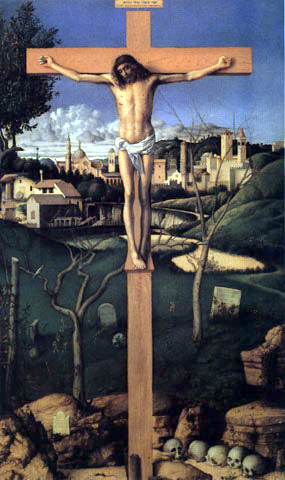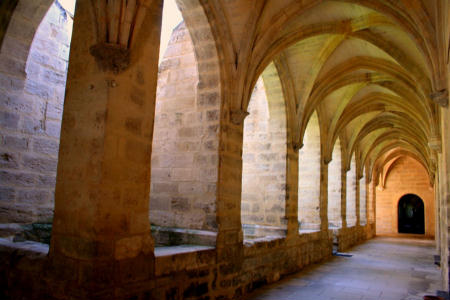 I have not written a column for Beliefnet in a long time. I have been writing a lot – just in other venues. As is the case with all of us, my life just seems to get busier and busier. However, I have not been able to get Beliefnet – and its potential for good – out of my mind or my heart. So, I begin again, I start anew with this column.At every new beginning I am reminded of one of my favorite passages from the Bible.
I have not written a column for Beliefnet in a long time. I have been writing a lot – just in other venues. As is the case with all of us, my life just seems to get busier and busier. However, I have not been able to get Beliefnet – and its potential for good – out of my mind or my heart. So, I begin again, I start anew with this column.At every new beginning I am reminded of one of my favorite passages from the Bible.
“The one who sat on the throne said, “Behold, I make all things new.” (Jesus to St John, recorded in the Bible, in the Book of Revelation 21:5).
Those five words from the Book of Revelation or the “Apocalypse” hold out the promise of the Gospel of Jesus Christ to all men and women in every Nation under the sun. They were spoken to the beloved disciple John on the Island of Patmos when he received a vision of the new heaven and new earth where the completion of the Redemption of Jesus Christ will be fully manifested.
Those words “Behold I make all things new” took on new meaning for me several years ago when I watched a powerful scene in the Mel Gibson masterpiece, “The Passion of the Christ.” In it Mary, the Mother of the Lord, runs to her wounded Son. He has fallen for the third time from the weight of the Cross. There is a flash back to an earlier day when that same son, as a child, is seen playing in the dusty streets of Nazareth and is about to fall.
With the tender love of a mother, Mary reaches out to her Son. Then the viewer sees her hand touch the wounded face of the Adult Son and Savior who looks at her, and through words addressed to her – He speaks to every human person – from the beginning of time until the end – saying: “Behold, I make all things new.” That is the hunger in the heart of every person.
Every New Year’s eve, many of us resolve to “be better” in the coming year. Very quickly thereafter we are confronted with the reality of our human condition and our fractured freedom. We know that our resolutions to change often end in failure. We are prone to making wrong choices in daily life. We sin. Classical theology speaks of this inclination as “concupiscence”.
The Apostle Paul wrote about this experience to the early Christians in Rome in the seventh chapter of his letter: “For I do not do the good I want, but I do the evil I do not want. Now if (I) do what I do not want, it is no longer I who do it, but sin that dwells in me… Miserable one that I am! Who will deliver me from this mortal body Thanks be to God through Jesus Christ our Lord.”
Our freedom is a reflection of the Image of God within us. However, it was fractured by the effects of the first sin. Our ability to exercise it properly by choosing the good has been undermined as a result. In the words of Blessed John Paul II taken from his marvelous letter entitled “The Splendor of Truth”, our “freedom itself needs to be set free.” Through the Incarnation, Saving Life, Death and Resurrection of Jesus Christ it can be. By grace we are capacitated to live our lives differently now. Jesus can make all things new! Life is about beginning again, and again, and again.
Every New Year we read numerous articles about the efficacy of New Year’s Resolutions. However, the fact remains, we all make them. The experience is nearly universal. The question is why? I suggest that they reveal something of our universal longing.
So too do our calendars. Some Nations use different calendars, but the passing of one year to another is marked by a deliberate period of reflection over the past year and a pledge to begin anew, to change, in the year to come. This is because we all hunger to be made new!
GK Chesterton wrote: “The object of a New Year is not that we should have a new year. It is that we should have a new soul and a new nose; new feet, a new backbone, new ears, and new eyes. Unless a particular man made New Year resolutions, he would make no resolutions.”
“Unless a man starts afresh about things, he will certainly do nothing effective. Unless a man starts on the strange assumption that he has never existed before, it is quite certain that he will never exist afterwards. Unless a man be born again, he shall by no means enter into the Kingdom of Heaven.”
We all want to change, to be better, to live our lives more fully and learn to love one another more selflessly. As we end one year and look to a new one, we pause and take inventory. In a rare moment of near universal reflection and honest self assessment, we admit our failures.
We pledge to learn from them and move toward a better future. In Little Gidding written by T.S. Eliott we find these often quoted words: “For last year’s words belong to last year’s language and next year’s words await another voice. What we call the beginning is often the end. And to make an end is to make a beginning.”
Over the years I have realized that every end really can become a beginning, for the man or woman who has faith in the God who invites us to begin again, again and again. He alone makes it possible by sharing His very Life with us. This gift is called grace and through receiving it we become what the Apostle Peter called “Partakers of the Divine Nature”.(2 Peter 1:4)
The older I get the more grateful I am that the promise to begin again is always available. The choice to receive the grace to begin again is also waiting, at the foot of the cross, for those who ask. In fact, we are always beginning again in life.One of my heroes of the faith is St. Jose Maria Escriva once wrote these words:
‘For a son of God each day should be an opportunity for renewal, knowing for sure that with the help of grace he will reach the end of the road, which is Love. That is why if you begin and begin again, you are doing well. If you have a will to win, if you struggle, then with God’s help you will conquer. There will be no difficulty you cannot overcome.’ (St. Jose Maria Escriva, The Forge, 344)
In and through Jesus Christ, there is a way to be made new. We can always begin again. That is at the heart of the Gospel, the Good News! St. Paul reminded the Christians in the City of Corinth – and reminds every one of us “whoever is in Christ is a new creation: the old things have passed away; behold, new things have come.” (2 Cor. 5:17)
So, I am back at Beliefnet, beginning again. I look forward to sharing with my readers, once again, all the reasons I am, a Catholic by Choice.

